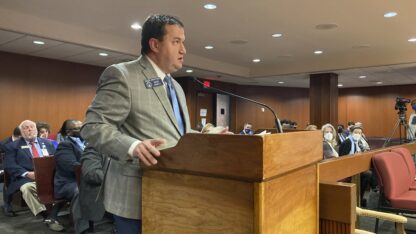Report: Preschool Suspensions Show Racial Disparities
Suspended students are more likely to be suspended again and are less likely to graduate high school on time, according to the U.S. Education Department. Recent data from the department’s Office of Civil Rights show suspensions for some students start as early as Pre-Kindergarten.
Hear the audio version of this story.
In addition, African-American students are suspended at a disproportionate rate. None of that surprises Susan Adams, the assistant commissioner of Georgia’s Pre-K program.
“One of the things we are aware of, and hear from teachers, is their need for additional support for working with kids on their social emotional skills, for working with kids that have challenging behaviors,” Adams says.
Georgia’s Department of Early Care and Learning provides training for teachers to deal with those students.
The data also show African-American students nationwide are suspended and expelled at a rate three times greater than white students. In Georgia, African-American boys account for 19% of preschool suspensions. That’s the largest percentage based on race and gender.
Pam Tatum is the CEO for Quality Care for Children, a non-profit organization focused on early childhood care. Tatum says race probably isn’t the only factor.
“In Georgia, race and poverty are pretty aligned,” Tatum says. “And so when we talk about children living in poverty, they have all kinds of challenges and stressors. And usually are raised in situations where there’s toxic stress, which is actually damaging to the brain architecture.”
Tatum says that may result in undesirable behaviors.
But experts agree suspensions aren’t a good solution for children that young. Mindy Binderman, the executive director of the Georgia Early Education Alliance for Ready Students, says it’s not an effective form of discipline.
“Preschoolers don’t go home and reflect on the consequences of what they’ve done and think about what they could do better,” she says. “A three or four year old can’t do that. Instead, usually what happens is that’s a wake-up call that something needs to change with the school or the environment or the parent.”
Susan Adams, Georgia’s assistant commissioner for Pre-K, agrees.
“To see a change in their behavior means that the adults are going to have to change,” Adams says. They’re going to have to change the environment; they’re going to have to change their strategies for working with that child. They’re going to have to do something so that it elicits a different response from the child.”
Adams says suspensions can help that process by allowing adults time to develop a plan. But she, and the other experts, say the best way to improve behavior is by developing children’s social and emotional skills.
9(MDAxODM0MDY4MDEyMTY4NDA3MzI3YjkzMw004))








